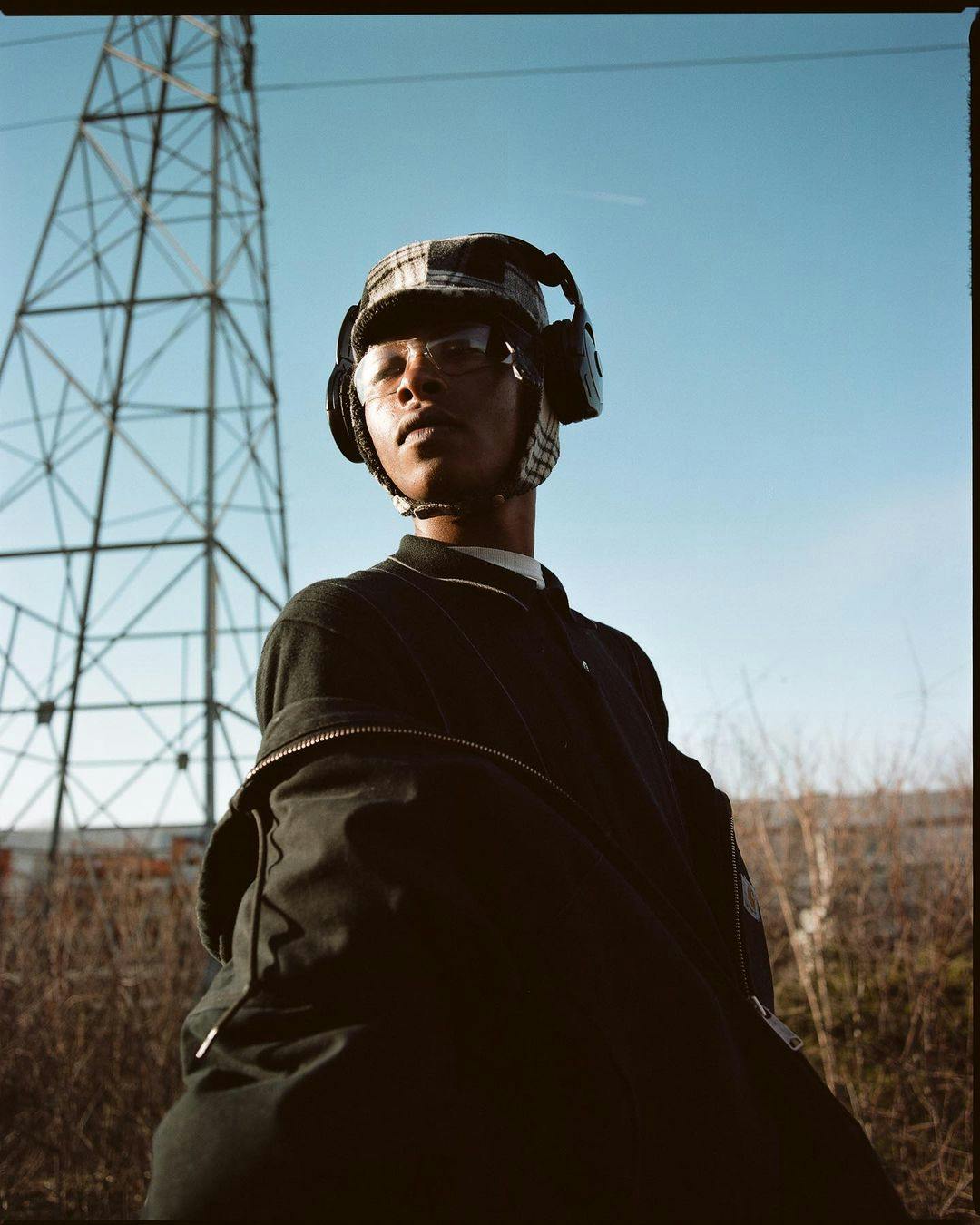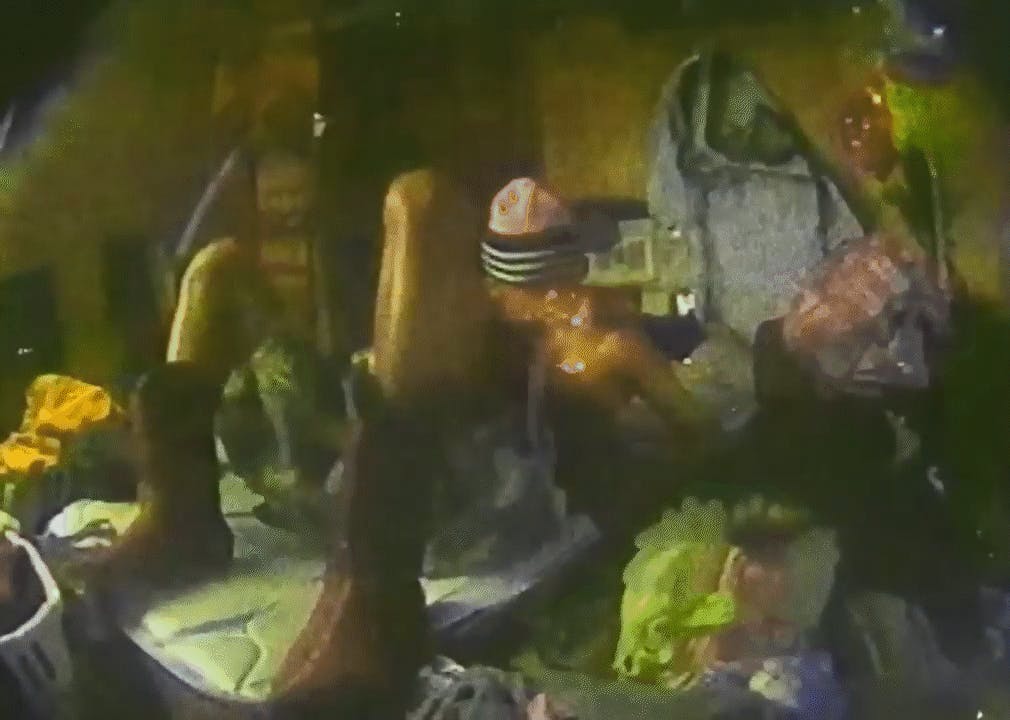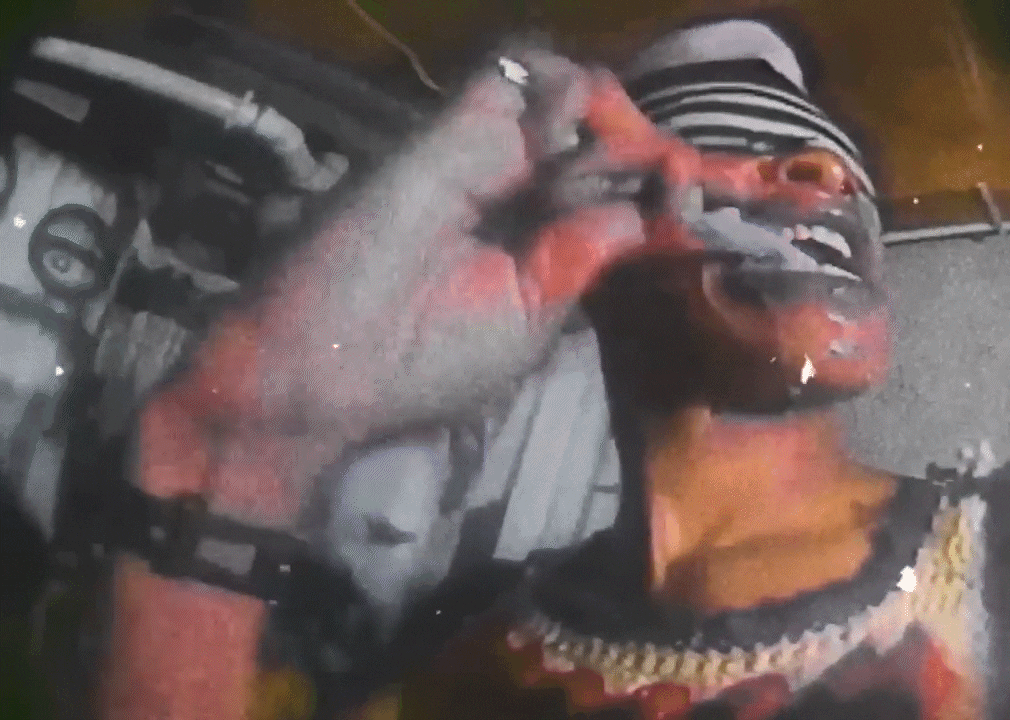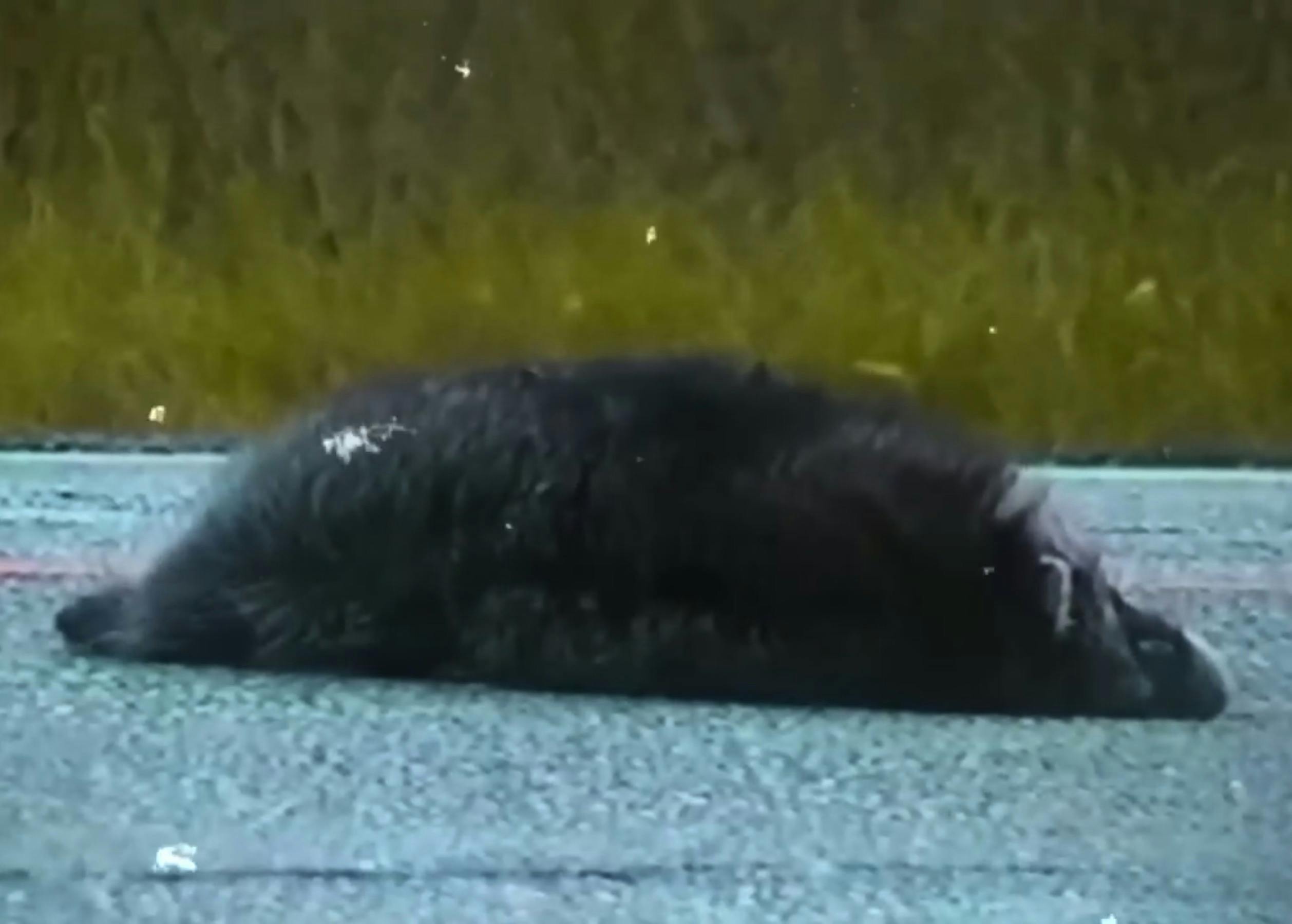
JALEN ELK: THE CYBORG WHO LEFT HIS WILL ON FILM
In conversation with marlow magdalene
Photo by Davis Dylan
Film Stills by Jalen Elk
The sound of T.V. static interrupts a clip from a 1990’s news outlet.
The news reporter states, “A report for tonight. Thank you for joining us.
We'll all be Black next..we'll all be back next week and I'll be Black.
We'll be back, though. It’s not my night–.” The T.V. static cuts her off.
A chorus of children eerily sing in the background as a murder of crows caw across the sky.
transcription of the conversation below

L.A. gothic filmmaker, marlow magdalene, interviews Detroit cyber-grunge filmmaker, Jalen Elk a.k.a. BIG UP MENACE. magdalene and Elk discuss his appreciation for 1990s Japanese Cyberpunk cinema, growing up in the motor city, and his effortless attempts at moving beyond a “Black Aesthetic.”
Elk: Yeah, we're just going somewhere. I’m very sorry.
magdalene: I'm the king of tangents. So the fact that I have not taken us on a tangent this entire time, I'm a little proud of myself.
Both laugh.
Elk: We're doing good. We’re doing great. Even though we’ve already broken the 12th wall of this experience.
magdalene: What did you do this morning? Tell me how you started.
Elk: I've been recording a couple of pieces of work for the past six hours, so I woke up really early. I'm out in Chicago right now, so I've been going really far with these morning walks. So that's kind of how it started…I went for a walk, and then I recorded for the first couple of hours.
It's not corny, but I just listen to the sounds of the city, and that helps me. It's very therapeutic just to have silence for a bit, so that's where I've been.
magdalene: So the first time we met and began talking, you gave me a bit of a homework assignment, which I really appreciate; I love to do some research. But you told me to watch Pinocchio 964.
Elk: Yeah.
magdalene: I truly think watching this cyber grunge [film] feels like an erotic fever dream. I haven't really watched something like this in a minute.
Both laugh.
magdalene: And it truly opened my world. I became very obsessed but I need to know why you wanted me to watch this film.
Elk: It's funny because I was eating a brioche, right? And I was going to say, watch this Adam Sandler film or something deep like a Minister Louis Farrakhan ten-hour speech.
So I decided to go easy on you and give you this film called Pinocchio 964, which is directed by one of my favorite directors, Shozin Fukui.
I hope you enjoyed it. How was the experience? Did you have fun?
Both laugh.
magdalene: I did have fun. I was a little nauseous during it. But it was tight. I think a scene that really stuck out to me was the subway scene.
Elk: The subway scene…

magdalene: Yeah, the subway vomit scene. I had to replay it four times because I was just so enthralled, but at the same time deeply grossed out.
Elk: Yeah, ironically, that film, I think is his second best, or more so it’s an honorable mention. His best film is Rubber’s Lovers (1996) and the parallel between both of those films is one is black and white and in color. The thing about Pinocchio [964] is that color gives you a more in-depth aspect to it, you know? So you can really feel the moment and it's very intense.
And I really feel like he transmuted heaven and hell in this one film. And it represents how people are caught up in this cybernetic realm now, to an extent. But most people are moving very machine-like. So I feel like he captures that aspect in such a grotesque manner.
Like I was very flabbergasted, but I admired him for his guerrilla style.
magdalene: I feel similar to Shozin Fukui, especially with your work, you're not one to shy away from body horror, and you're also not one to shy away from being sort of this imitation of being a cyborg, which is a character that you really embody in specific in your short film, Anthology Du Motion Noir (2023).
You're starring as the main character, but you're also the writer and director. I see so much inspiration from Pinocchio 964, but for me also, you being a Black filmmaker, I feel like you take it in such a different world and direction.
I'm so curious as to how you navigate being on screen and also being behind the camera when you're writing your films.

Elk: I think the biggest aspect of making a piece before I even actually execute shooting any type of body of work, whatever realm it is (art, music, film, dance) because you know, everything's one big dance of life, we're all a bigger picture of God's image or whatever God is to whoever. I feel like the important aspect of learning by yourself and studying your reference points is the biggest part for me.
It's humbling yourself and saying, “Hey, you have something great in your heart, in your mind that you want to pour out on your sleeve with the work, but you got to study these other excellent legends first because they've done it long before you were even here in the physical essence at least.”
So that’s the biggest thing I'll go back and study all these different references from all walks of life, and then it embodies itself to an idea. And I'll script it down and say, okay. And majority of the time it stems from personal life experience.
In 2008 I stayed in the Salvation Army shelter on the eastside of Detroit when I was in third grade. That’s when I first started skateboarding. I had a PSP and I watched this film, called The Zeitgeist. Around that time, everything was very metal; the building inside was just like a lunch hall, so everything was very silvery and metal—in a cold slab type of way.
And it's funny because I'll use experiences like that, from back then and that gritty Detroit reference, to now in such a divinely guided way that I really just stemmed from my past experiences in life. Long story short.

Audio Description: Soundbite from Anthologies Du Moution Noir (2022).
magdalene: What makes you such a complex artist is this juxtaposition that you do between really grotesque imagery, showing the grittiness of the city, and these beautiful landscape shots. But at the same time, they feel like paintings, you know?
Something that we were touching on a little bit too is throughout the chaos in your film it feels like this journey of rebirth. These landscape portraits, to me, create moments of solace where we kind of get to sit with all the chaos that we just saw.
You talk about going on these walks throughout Chicago, you talk about being out in the city…I'm so curious what brought on, in particular, editing these really quiet shots which again creates such a beautiful moment of rest within your work.
Elk: The most important aspect, I think, or I feel, is really keeping quiet when it's time to keep quiet. And that could be staying indoors. When I first started working on Black Sheep, I had COVID, and I wrote the script. Then I ended up building the set for about ten hours each day.
Around the end of the film, I went to Chicago in the autumn of 2022, and I was there for about a month. I just wore this suit every single day, strictly wore this suit, had my tripod with me and my camera, and literally was on the go, just out and about.
And those were the quiet moments because when I was in the world of the actual film in my sets, I had to be in that; I had to embody the essence of this character; I had to tap into that spirit of how this person feels or thinks. Because really it's Edward, it's not Tim Burton. And that's a reference point. As far as my directorial/character standpoint.
So I really had to step outside of myself. But this character's essence is really internal, it's an essence internally that’s inside of me that I just embodied. And I really made sure that when I shot outside, it was completely different from the world of the character, because it was really just the reality of what Jalen was viewing in nature.
...I really had to step outside of myself. But this character's essence is really internal, it's an essence internally that’s inside of me that I just embodied.




magdalene: These two very complex sides of one character that you embody show up in that shot with the beetles crawling over the model’s faces; I’m so obsessed with those shots. [It’s such a] beautiful cinematic gesture of showing something really grotesque, and yet, it felt like a commentary on how we're kind of really obsessed with beauty right now. We're in such a superficial era, in particular within our generation. That shot just felt so post-punk to me. It just felt like, “Who the fuck cares about this really beautiful picture of this person on this cover?” These beetles are taking over and almost eroding it. I'm so curious as to how that started. Where did you get the beetles from? I want to just kind of be in your mind for a little bit for that particular shot.
Elk: Yeah, I really like your take and you pretty much hit the spot with that essence as far as the beauty standard. I feel like every being is beautiful in whatever way that means to them and the world, but I did want to capture an image of what I felt was a standard being pushed on the masses.
In reverse, it might not even be about the image on the back, but what’s over that beautiful image? But it's both duality with everything. And that's why I'm glad you took that because really that's what it truly was about that beauty standard throughout the whole film of what is beautiful to me.
I learned transmuting life experience from a very young age so the most hellish things became very heavenly to me because I learned how to appreciate the ability to even appreciate. And I try to capture that with images like that because I used to have the faintest heart when I was younger. And I think when I saw how ruthless the world can be it created this beautiful image of sternness with visuals and I try to represent that with my work because it can be just as stern or off-putting to someone else. But if they know that reference point, it truly is a vulnerable, beautiful thing.

magdalene: When I first saw your film, I watched it and I just was like, ‘Oh, he’s sensitive’. There is a certain type of tenderness and fragility that you play with your masculinity that I think is really refreshing. There’s such a need to perform a certain type of monolithic Black masculinity and there's something that you do that just fully rejects that. Whatever expectations you came in with, while watching [the film], you completely shut it down within the first 20 seconds of your film.
Elk: The best reference to that statement is on “Dead or Alive,” [which is] the first track on my album. Like where I said ‘Your preconceptions projected are spine-tingling see rejected;’ I feel like I'm constantly trying to reject any preconceptions. As long as you feel comfortable in yourself, as whatever being you like to interpret yourself as I feel like it's completely fine to be against the grain of that.
Especially as a Black man from Detroit, you know, they wanted me to be overly masculine, or in the art game, people wanted me to be more feminine but I feel like we exude these things daily. As long as there is a balance with that, it can shock others because it's either one or the other, especially with work. You know?
Most people don't want to stand. They'd rather fall or get in line in the crowd with everybody and deep down, they're heartbroken for the rest of their lives because they're portraying a role that they're not.
And I think the important thing is just to be yourself and not be afraid of being excluded because it was divinely guided for you to be there at that time and place. No man can stop anything even if it appears that way in this physical way, you know?
So I think that is the biggest thing. Just own up to yourself. Look at the image, like what you see, or if you don't do something about it. If you can't change your situation, you can change your outlook on it and that outlook can change your situation.
And I think that's kind of what I'm doing with my sexuality internally. Just as a man out and about, I don't even feel like a man or a woman or anything.
I just feel like a being of eternal light. So maybe other people need to see themselves as that and that's how they can get comfortable. Just look at yourself like a light with a little bit of clouds around it.
And yeah, try to swat away the moths…

Most people don't want to stand. They'd rather fall or get in line in the crowd with everybody and deep down, they're heartbroken for the rest of their lives because they're portraying a role that they're not.
Footnotes:
The soundscape of the interview includes electronic field recordings and soundbites from magdalene’s film archive. Interspersed throughout the conversation are sound clips from Jalen’s short film.
Check out Anthology Du Motion Noir (2023) here.
